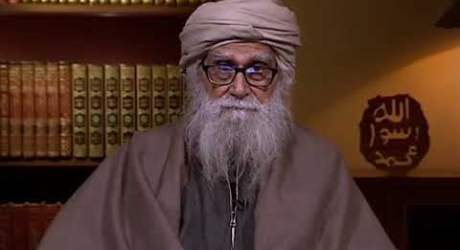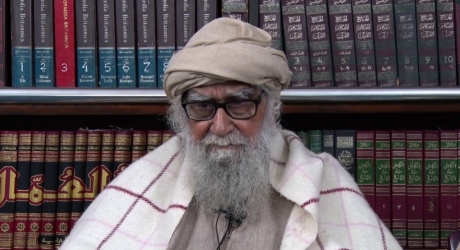The Quran describes one basic quality of the believers thus: “Those who believe love God most.” (2:165) The Believers mentioned in the Quran in this verse are those who have discovered God at the level of realization. All their feelings and emotions will be associated with God alone. Their hearts and minds will focus solely on God.
Owing to his limitations, man cannot see God in this present world, but he experiences God’s mercy and blessings at every moment, and this experience is the real source of his love of God. Everything man has received in this world is a blessing from God. The more one thinks of divine blessings, the more one’s love of God will increase. The source of the love of God is the discovery of blessings and not the sight (deedar) of the Benefactor (God).
The realisation of God is the discovery of the Benefactor, who is the source of all blessings. When man attains this realisation in the real sense, the love of God wells up within him. Every fibre of his being is enlightened with divine love. Obedience to God is, without a doubt, the demand of faith, but it would be an underestimation of the love of God if it is taken only in the sense of obedience. Obedience is only a legal description of the relationship with God, whereas love entails man’s entire existence being moulded in the remembrance of God. Man comes to acknowledge God in the perfect sense when it is with the whole of his being.
The Quran says: “Remembrance of God gives one’s heart peace of mind”. (13:28) Moreover, it means that only the love of God can give man peace of mind in the real sense.
Featured Articles
Featured Videos
FAQs
According to the Quran,
Those who believe love God most. (Quran 2:165)
What is love? Love is a result of discovery. When you discover that God has already given me great reward in this world in the form of His numerous bounties, you become immersed in a sea of gratitude for Him, which in turn produces love for God.
Source: Love of God
I have spent significant time on this topic and my conclusion is that nature has instilled a special mechanism in a person by which he can control his anger. When angry, all one has to do is observe silence. Anger incites a psychological fire within a person and in the resulting rage, he is not able to control himself. But when one becomes silent in moments of anger, the rage instantly begins to take a downward trend. So, when someone provokes us, we must simply become quiet.
At all such times, I myself do not react and I have experienced that anger takes no time in subsiding. Reaction leads to chain reaction and not reacting stops the chain reaction, but in order to stop the chain reaction, one needs the power of self-control. Only the spiritually strong can break the chain reaction in a situation involving provocation and rage. It is a sign of great strength. As per a tradition of the Prophet Muhammad:
The strong man is not one who is good at wrestling, but the strong man is one who controls himself in a fit of rage. (Sahih al-Bukhari, hadith no. 5763)
It has also been alluded to in the Quran that one may earn a position in Paradise by being forgiving at times of anger:
for those who spend, both in prosperity and adversity, who restrain their anger and are forgiving towards their fellow men—God loves those who do good works. (Quran 3:135)
Even I used to get angry in my early days, but my anger led me to self-thinking, which made me realize that anger yields no result. I then concluded that it was futile to waste energy on anger.
During 1975, I had written an article for the publication, Al-Jamiat, where I had narrated the story of how I was invited to Ahmedabad by a young Muslim engineer who had set up a factory there. The engineer was a very competent person. As he was showing me around the place, we came across a new kind of machinery which was produced at that time only for export purpose. While demonstrating the prowess of the machine, he first pushed on a button and its flywheel started rotating at top speed. He then pushed another button and the flywheel immediately changed its direction and started rotating opposite to the previous position. As I saw this, it struck me that when matter (or machine) has the quality to change its direction within seconds, then a human being should have this ability manifold. After this incident, I started training my mind to change my emotion within seconds whenever a situation requiring so arises.
Hence, in moments of rage when our natural tendency is to speak or react aggressively, we need to instantaneously change the direction of our flywheel and remain silent. Without doubt, the anger shall dissipate and we shall be in a position to prudently handle the situation.
We do love God. He is our supreme benefactor, the most gracious and the most merciful. Piety in human beings is a manifestation of the love they have for God. Having fear of God is not in the same sense as having fear of a ferocious animal. Rather, fear of God is positive fear and can be understood in the context of obedience to God. While God is compassionate and benevolent toward human beings, He is also very just. Thus, fear of God is a result of the realization that God has the ability of punishing wrongdoers for their evil deeds. God is all-knowing and nothing is, or can be, hidden from Him. A person who has fear of God constantly lives with the sense of being accountable to Him. Even if his fellow human beings do not have the power to implicate him for his wrongful actions, a person who has fear of God knows that in the Hereafter he will surely be answerable to the Almighty for his actions, big or small. It is this that causes a believer to naturally fear God, a concept which serves as a source of reform in his life.
The Quran describes one basic quality of the believers thus: “Those who believe love God most.” (2:165) The Believers mentioned in the Quran in this verse are those who have discovered God at the level of realization. All their feelings and emotions will be associated with God alone. Their hearts and minds will focus solely on God.
Owing to his limitations, man cannot see God in this present world, but he experiences God’s mercy and blessings at every moment, and this experience is the real source of his love of God. Everything man has received in this world is a blessing from God. The more one thinks of divine blessings, the more one’s love of God will increase. The source of the love of God is the discovery of blessings and not the sight (deedar) of the Benefactor (God).
The realisation of God is the discovery of the Benefactor, who is the source of all blessings. When man attains this realisation in the real sense, the love of God wells up within him. Every fibre of his being is enlightened with divine love. Obedience to God is, without a doubt, the demand of faith, but it would be an underestimation of the love of God if it is taken only in the sense of obedience. Obedience is only a legal description of the relationship with God, whereas love entails man’s entire existence being moulded in the remembrance of God. Man comes to acknowledge God in the perfect sense when it is with the whole of his being.
The Quran says: “Remembrance of God gives one’s heart peace of mind”. (13:28) Moreover, it means that only the love of God can give man peace of mind in the real sense.
Source: Love of God











